Losing weight can be challenging, especially when navigating the often conflicting advice surrounding nutrition. For those interested in plant-based living, the good news is that a well-planned vegan diet can be both nourishing and effective for weight management. Understanding how to lose weight on a vegan diet involves more than just cutting out animal products; it requires strategic choices, informed meal planning, and a focus on whole, nutrient-dense foods that support metabolism and satiety. In this comprehensive guide, we’ll explore the science-backed ways to successfully pursue weight loss with veganism, including practical tips, expert insights, and examples of vegan weight loss foods and meal plans that promote sustainable fat loss without sacrificing nutrition or flavor.
You may also like: Plant Based Diet vs Standard American Diet: What the Latest Studies Reveal About Long-Term Health Outcomes
The Science Behind Losing Weight with Veganism
The growing popularity of vegan eating and weight loss isn’t without scientific merit. Research consistently shows that individuals who follow a plant-based diet tend to have lower body mass indexes (BMIs), reduced risks of obesity, and improved metabolic markers compared to those on omnivorous diets. A key factor contributing to this trend is the high fiber content and lower energy density of whole plant foods, which promote feelings of fullness without contributing excessive calories. Studies have demonstrated that a well-balanced vegan nutrition plan for weight loss, when appropriately designed, can support healthy fat loss while preserving lean body mass.
A vegan diet naturally eliminates many calorie-dense and highly processed animal products, such as fatty meats and full-fat dairy, which are often linked to increased body fat accumulation. Instead, it emphasizes fruits, vegetables, legumes, whole grains, nuts, and seeds. These foods are rich in essential nutrients and bioactive compounds that regulate hormones, enhance digestion, and reduce inflammation—all critical components in any vegan fat loss plan. Importantly, plant-based diets also tend to reduce the intake of saturated fats while increasing the consumption of polyunsaturated fats, which may further support a healthy weight profile.
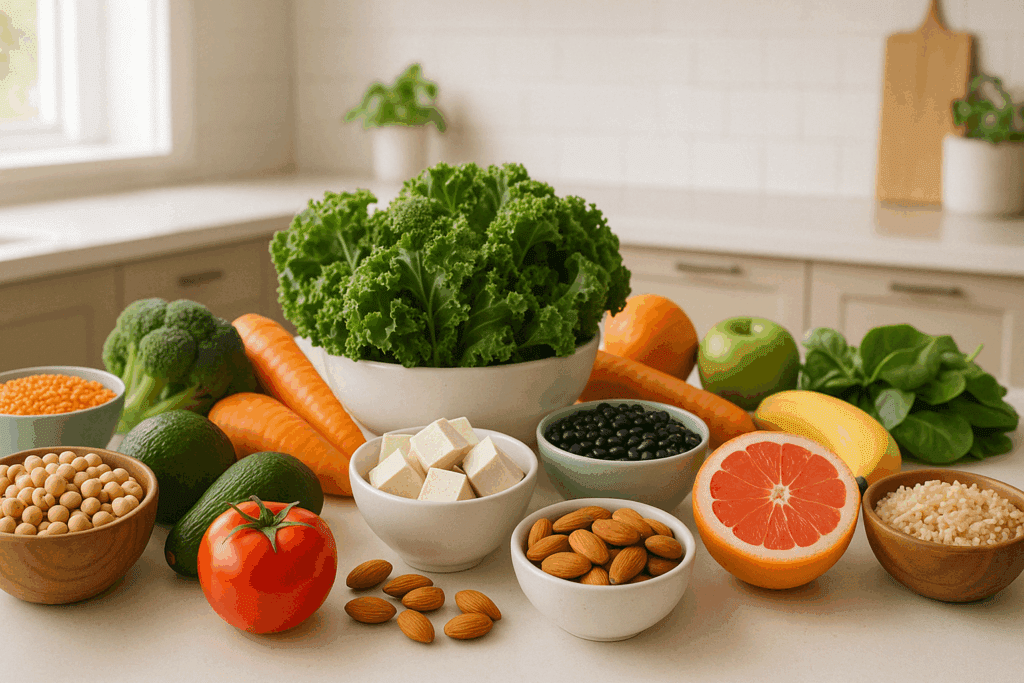
Understanding the Mechanisms of Fat Loss on a Vegan Diet
To effectively lose weight on a vegan diet plan, it’s essential to understand how the body burns fat and how plant-based foods can influence this process. Fat loss occurs when the body is in a caloric deficit—consuming fewer calories than it expends. However, not all calorie deficits are created equal. The quality of the calories consumed plays a significant role in determining whether weight loss will come from fat stores or lean muscle tissue.
A whole-food, plant-based vegan weight loss plan focuses on calorie density, satiety, and nutrient availability. Foods like leafy greens, cruciferous vegetables, beans, and whole grains provide bulk and fiber, which slow digestion and promote long-lasting satiety. This makes it easier to maintain a calorie deficit without the discomfort of constant hunger. Moreover, fiber not only contributes to fullness but also supports gut health, which is increasingly recognized as a key player in weight regulation and metabolic function.
Plant-based proteins such as lentils, chickpeas, tempeh, and tofu are integral to any vegan meal plan for fat loss. These foods offer amino acids necessary for muscle repair and maintenance while being lower in calories compared to animal protein sources. Maintaining muscle mass during weight loss is vital, as muscle tissue is metabolically active and helps burn more calories even at rest. Including a variety of plant-based proteins ensures that the body remains strong and metabolically efficient throughout the weight loss journey.
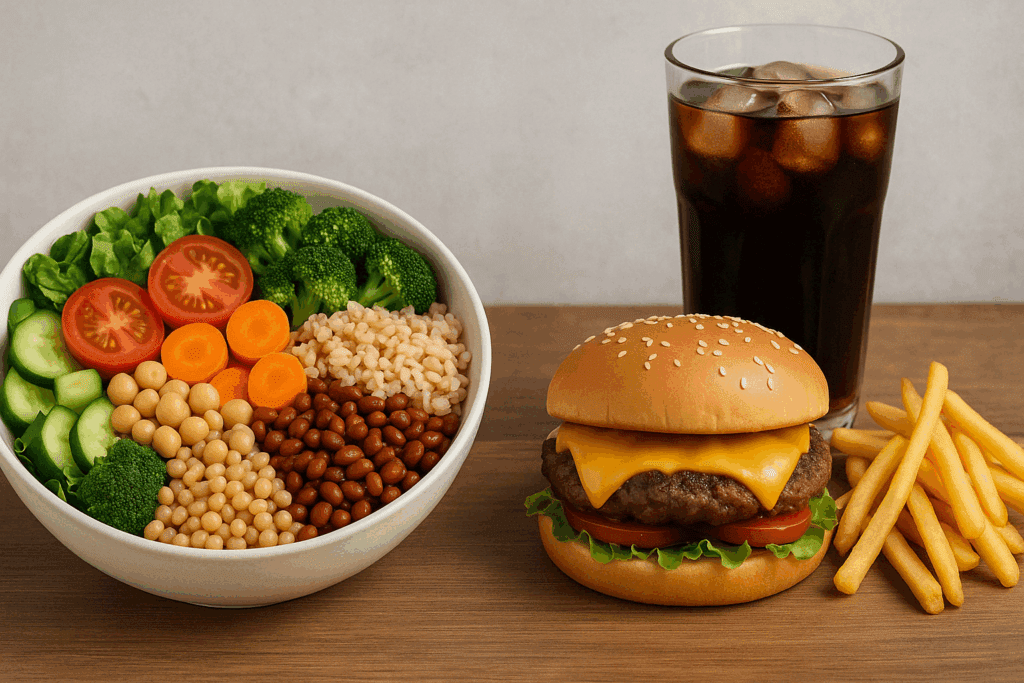
The Role of Whole Foods in a Vegan Weight Loss Meal Plan
Central to any successful vegan diet meal plan to lose weight is a reliance on whole, unprocessed foods. These foods are rich in vitamins, minerals, antioxidants, and fiber—components that not only support fat loss but also contribute to overall well-being. Whole foods nourish the body on a cellular level, ensuring that weight loss does not come at the expense of essential nutrition.
Whole grains such as quinoa, brown rice, barley, and oats are staples in a well-rounded vegan meal plan for fat loss. These grains provide complex carbohydrates that release energy slowly, helping to maintain stable blood sugar levels and prevent the energy crashes that often lead to overeating. Legumes like black beans, lentils, and edamame are both high in protein and fiber, making them ideal for weight loss without hunger.
Vegetables, particularly non-starchy varieties like leafy greens, broccoli, cauliflower, zucchini, and peppers, can be eaten in generous portions while contributing minimal calories. These vegetables are packed with micronutrients and phytonutrients that aid metabolism, detoxification, and cellular repair. Fruits, while naturally higher in sugar, can still play a valuable role in a vegan weight loss plan when consumed in moderation and paired with fiber or protein to reduce glycemic impact.
Strategic Meal Planning for Vegan Fat Loss
Creating a vegan diet plan for weight loss fast results requires more than simply choosing plant-based foods—it involves deliberate planning and balance. One effective strategy is to structure meals around the “Plate Method,” filling half the plate with non-starchy vegetables, a quarter with whole grains or starchy vegetables, and a quarter with legumes or plant-based protein sources. This ensures a variety of nutrients while maintaining appropriate portion sizes.
Another important aspect is meal timing and frequency. While intermittent fasting can be effective for some individuals, others may benefit from regular meals spaced throughout the day to prevent excessive hunger and ensure steady energy levels. What matters most is consistency and adherence to a plan that supports a calorie deficit without extreme restriction.
A sample day on a vegan weight loss meal plan might include a hearty oatmeal breakfast with chia seeds and berries, a large salad with chickpeas and tahini dressing for lunch, a mid-afternoon snack of carrot sticks and hummus, and a dinner of stir-fried vegetables with tofu and brown rice. This type of plan offers balance, satisfaction, and the nutrients necessary to fuel fat loss and overall health. With the right structure, even those new to vegan eating and weight loss can experience success and sustainability.
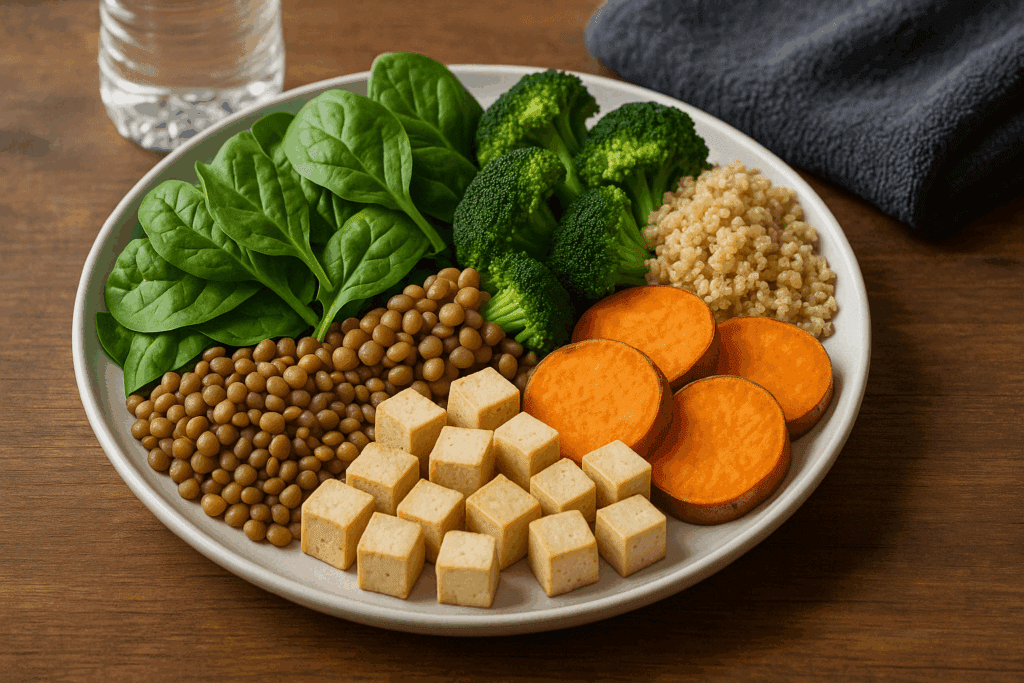
Overcoming Common Pitfalls When Losing Weight Plant-Based
While the benefits of losing weight with veganism are well-supported, there are several common pitfalls that can hinder progress if not addressed. One such pitfall is relying too heavily on processed vegan foods. Vegan cookies, chips, frozen meals, and meat alternatives often contain refined oils, sugars, and additives that can contribute to weight gain rather than loss. Although these products are convenient and appealing, they are not ideal for a vegan nutrition plan for weight loss.
Another issue arises when individuals underestimate portion sizes. While plant-based foods are generally lower in calories, large portions of calorie-dense items like nuts, seeds, dried fruit, and avocado can quickly add up. Moderation is key, especially when trying to maintain a calorie deficit. It’s also important to balance macronutrients—focusing not just on carbs or fats, but ensuring adequate protein intake to support metabolism and muscle maintenance.
Lack of planning can also derail a vegan fat loss plan. Without prepared meals or snacks, it’s easy to fall back on less nutritious options, especially when time is limited. Batch cooking, meal prep, and keeping healthy snacks on hand can help mitigate this issue. Additionally, setting realistic expectations and understanding that healthy fat loss takes time can foster patience and long-term commitment.
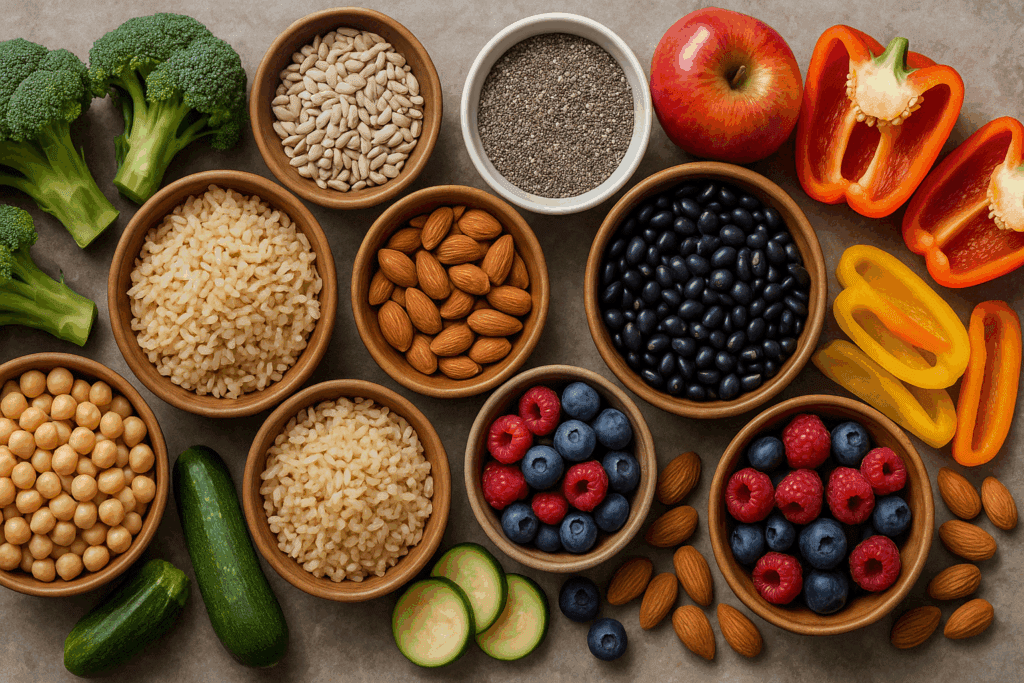
Lifestyle Habits That Enhance Vegan Weight Loss Success
Sustainable weight loss is about more than food—it’s about creating a lifestyle that supports your goals. Incorporating regular physical activity into your routine enhances the effectiveness of a vegan weight loss plan. Both aerobic exercises like walking, cycling, and swimming, and resistance training using weights or bodyweight exercises help burn calories and maintain muscle mass, which is essential for metabolic health.
Quality sleep is another crucial factor. Poor sleep disrupts hormones that regulate hunger and satiety, such as ghrelin and leptin, leading to increased cravings and appetite. Prioritizing 7–9 hours of restful sleep each night supports weight management and overall vitality. Stress management is also critical. Chronic stress elevates cortisol, which has been linked to increased abdominal fat and difficulty losing weight. Techniques such as mindfulness, meditation, deep breathing, and spending time in nature can help reduce stress and enhance resilience.
Hydration plays a subtle yet significant role in a vegan meal plan for fat loss. Water supports digestion, nutrient transport, and metabolic processes. Drinking a glass of water before meals may also help reduce calorie intake by promoting a feeling of fullness. Herbal teas and low-calorie beverages can contribute to daily fluid intake without the extra calories of sugary drinks or high-fat vegan lattes.
Realistic Results: Will Going Vegan Help You Lose Weight?
A common question is, “Will you lose weight on a vegan diet?” The answer depends on how the diet is structured. While going vegan can help you lose weight, it is not a guarantee. A vegan diet filled with whole foods, balanced macronutrients, and appropriate calorie intake can indeed lead to steady and sustainable fat loss. However, becoming vegan alone is not enough—success lies in intentional choices and consistency.
Many people report success stories, saying, “This is how I lost weight vegan,” highlighting transformations in body composition, energy levels, and overall health. These stories often share a common thread: the shift from processed to whole foods, increased fiber intake, regular movement, and mindful eating habits. When approached thoughtfully, a vegan weight loss plan can be both effective and transformative.
It’s important to note that weight loss outcomes vary from person to person. Factors such as genetics, starting weight, activity level, age, and hormone balance all play roles in how quickly and effectively one can lose weight on a vegan diet plan. Rather than focusing solely on the scale, measuring progress through improved energy, sleep, digestion, and confidence can offer a more holistic view of success.
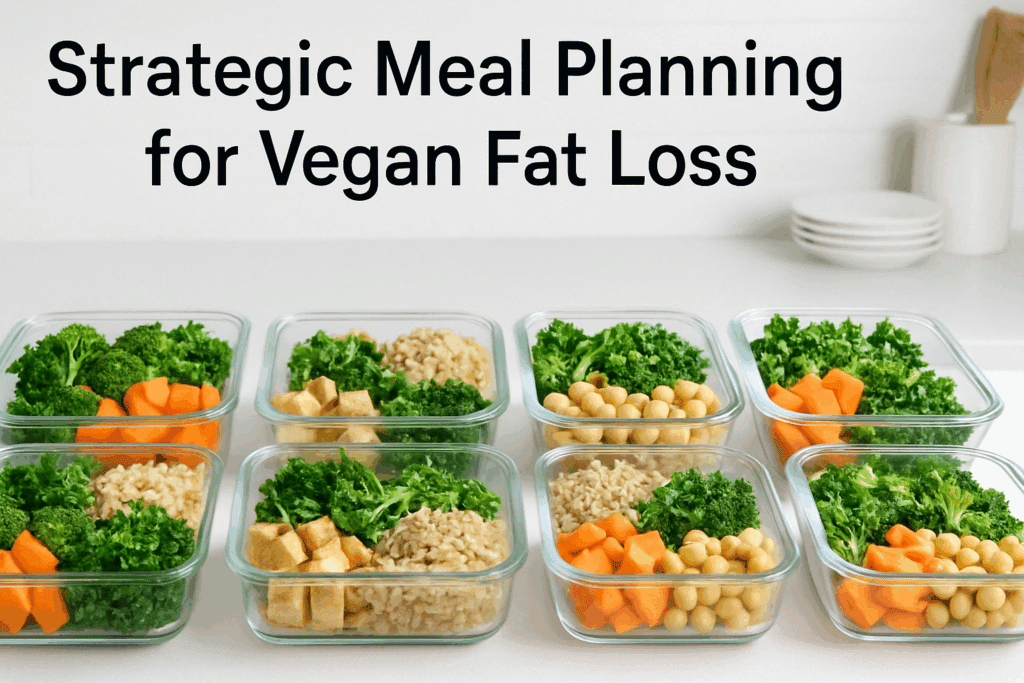
Frequently Asked Questions: Vegan Eating and Weight Loss
1. What makes a vegan weight loss meal plan more effective than other diet approaches?
A vegan weight loss meal plan can be especially effective due to its emphasis on whole, fiber-rich foods that support satiety while naturally lowering caloric intake. Unlike many restrictive diets, losing weight with veganism encourages the consumption of nutrient-dense meals that nourish the body while facilitating fat loss. When built around legumes, whole grains, leafy greens, and healthy fats in moderation, a vegan meal plan for fat loss promotes hormonal balance and digestive efficiency—two critical factors in sustained weight management. Additionally, plant-based eating tends to reduce inflammation, which may improve metabolic function and enhance fat-burning potential. This approach isn’t just about weight loss; it’s about supporting long-term wellness, making it an appealing alternative to crash diets or short-term fixes.
2. How can I avoid nutritional deficiencies while following a vegan fat loss plan?
Nutrient sufficiency is essential when following a vegan fat loss plan, especially since certain nutrients are less abundant in plant-based foods. To ensure a complete and balanced intake, individuals should focus on consuming fortified foods and a diverse range of vegetables, legumes, nuts, seeds, and whole grains. Incorporating foods rich in iron, B12 (via supplementation or fortified products), omega-3 fatty acids (from flaxseeds or algae oil), and calcium (from leafy greens or fortified plant milks) helps meet essential needs. Pairing iron-rich vegan weight loss foods like lentils or spinach with vitamin C sources such as citrus fruits can enhance absorption. Working with a registered dietitian who understands vegan nutrition can also provide personalized support for those seeking to lose weight on a vegan diet plan without compromising health.
3. What role does gut health play in vegan weight loss success?
Gut health plays a pivotal role in weight regulation, and a fiber-rich vegan nutrition plan for weight loss can have a profound impact on the gut microbiome. Studies show that diverse plant-based diets promote a more varied and stable population of beneficial gut bacteria, which may influence fat metabolism, hunger hormones, and inflammation. Fermented vegan foods such as tempeh, kimchi, and sauerkraut introduce probiotics that further support digestive function and nutrient absorption. Additionally, prebiotic fibers found in garlic, onions, oats, and bananas fuel healthy microbes that are linked to improved fat oxidation and reduced cravings. By nurturing gut flora, individuals can make their vegan weight loss plan more metabolically efficient and sustainable.
4. Are there psychological benefits to choosing vegan eating for weight loss?
Beyond physical outcomes, adopting vegan eating and weight loss strategies may offer meaningful psychological advantages. Many individuals report a sense of empowerment and greater alignment with personal values when choosing plant-based diets, which can increase motivation and long-term adherence. The discipline and mindfulness required to plan meals intentionally often carry over into other areas of life, enhancing self-regulation and goal-setting behaviors. Additionally, the anti-inflammatory properties of a well-designed vegan diet may positively influence mood and cognitive performance. These psychological shifts can play a vital role in helping individuals stay committed to their vegan weight loss plan, especially during challenging moments.
5. Can being vegan help you lose weight if you’re very physically active?
Absolutely—can being vegan help you lose weight while engaging in regular physical activity? Yes, when meals are properly structured to support performance and recovery. Highly active individuals may require more calories and protein, but these can be easily met through strategic use of legumes, whole grains, nuts, seeds, and plant-based protein powders. A vegan diet meal plan to lose weight for active people should emphasize timing—eating sufficient pre- and post-workout meals to maintain energy and support muscle repair. Smoothies with pea protein, sprouted grain wraps with hummus and greens, and high-protein stews are examples of meals that fuel activity without excess calories. With a smart approach, losing weight plant based can complement an active lifestyle while supporting strength and endurance.
6. What are the best strategies for overcoming plateaus on a vegan weight loss plan?
Weight plateaus are a natural part of the journey and can occur even when following a solid vegan weight loss meal plan. To break through, it helps to reassess calorie intake—sometimes, weight loss reduces metabolic needs, requiring adjustments. Adding or modifying exercise, especially by incorporating strength training, can stimulate new progress by boosting muscle mass and increasing caloric expenditure. Cycling high- and low-calorie days (known as calorie cycling) may also help reset metabolism. Additionally, tracking micronutrient intake may reveal imbalances or deficiencies that affect energy or hormonal function. Remember, sustainable progress when losing weight with veganism often requires flexibility and curiosity rather than rigid adherence to a single formula.
7. How can social settings and travel be managed while on a vegan diet plan for weight loss fast results?
Managing social scenarios and travel while sticking to a vegan diet plan for weight loss fast results can be tricky, but it’s entirely possible with preparation. Researching vegan-friendly restaurants in advance, packing portable snacks like roasted chickpeas or homemade protein bars, and clearly communicating dietary needs can minimize stress. Choosing meals that focus on vegetables, legumes, and whole grains helps keep nutritional goals intact, even when dining out. Social support also plays a role—surrounding yourself with individuals who respect your choices can ease pressure and reinforce commitment. Maintaining flexibility while staying focused on the core principles of your vegan weight loss plan ensures you can enjoy life without compromising progress.
8. Is there a difference between losing weight with veganism and a standard calorie-restricted omnivorous diet?
Yes, the two approaches differ significantly in how they affect hunger, nutrient intake, and long-term sustainability. Losing weight with veganism typically involves a higher intake of fiber and phytonutrients, which support satiety and reduce cravings. Vegan weight loss foods such as beans, lentils, and whole grains provide slow-burning energy and a sense of fullness that is often lacking in standard calorie-restricted omnivorous diets. Furthermore, plant-based diets may positively influence lipid profiles and reduce systemic inflammation, offering additional health benefits beyond weight control. While both approaches can lead to fat loss, a vegan meal plan for fat loss often encourages a broader shift toward wellness and ethical living, making it more meaningful for many individuals.
9. How can I personalize a vegan diet meal plan to lose weight according to my unique metabolic needs?
Personalizing a vegan diet meal plan to lose weight involves assessing your metabolism, body composition, lifestyle, and preferences. Some individuals may thrive on higher-carb plans rich in legumes and grains, while others benefit from a slightly higher fat intake with avocados, seeds, and olive oil. Using wearable fitness trackers or working with a dietitian can help determine your total daily energy expenditure, allowing for accurate meal planning. Understanding how your body responds to different macronutrient ratios can guide adjustments in your vegan nutrition plan for weight loss. By tracking your progress with photos, energy levels, and how your clothes fit—rather than obsessing over the scale—you can fine-tune your approach for long-term success.
10. Will going vegan help you lose weight permanently, or is it only a short-term solution?
Will going vegan help you lose weight for the long haul? The answer lies in how sustainable and nutrient-conscious your approach is. A whole-food vegan weight loss plan built around long-term health rather than quick fixes is far more likely to yield lasting results. The focus on fiber, plant-based protein, and anti-inflammatory foods supports metabolic resilience and weight maintenance after the initial fat loss phase. Transitioning from a short-term mindset to a lifestyle commitment is key. By viewing vegan eating and weight loss as part of a holistic health journey, individuals can experience permanent benefits that extend far beyond the number on the scale.
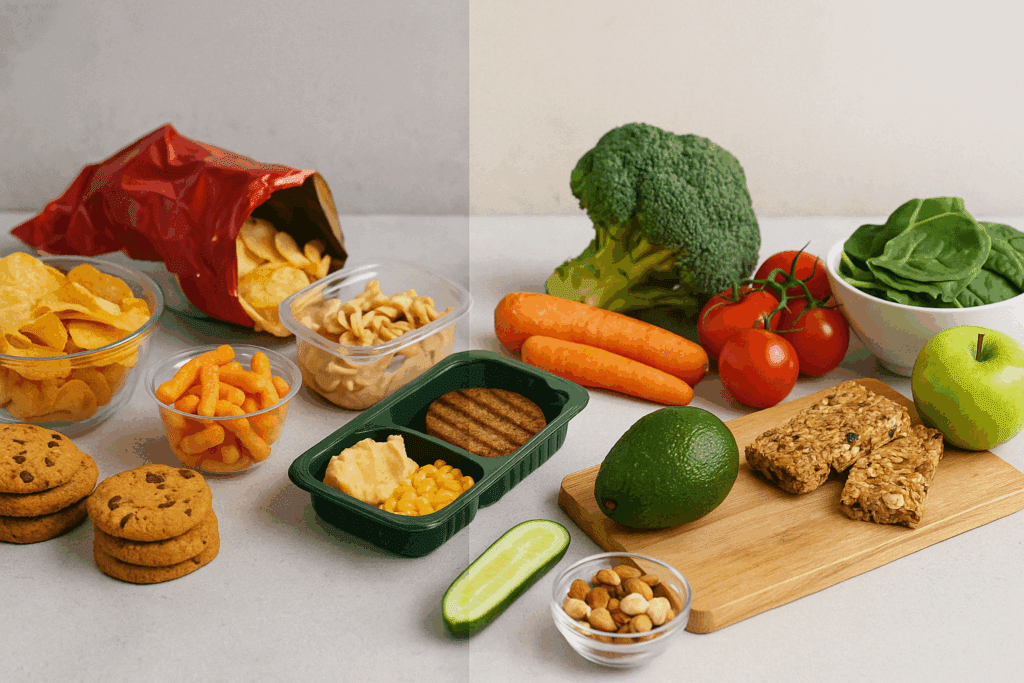
Conclusion: Embracing Vegan Eating and Weight Loss for Long-Term Health
Understanding how to lose weight eating vegan is about more than dietary restrictions—it’s about embracing a lifestyle rooted in nourishment, intention, and long-term health. A vegan weight loss plan built around whole foods, rich in fiber and plant-based proteins, can promote fat loss while preserving muscle and vitality. Whether you’re just starting out or refining your approach, focusing on a vegan diet meal plan to lose weight can be both effective and empowering.
The path to losing weight plant based may come with challenges, but it also offers profound rewards. With careful planning, balanced meals, and supportive lifestyle habits, you can achieve lasting changes that benefit not only your weight but also your cardiovascular health, digestion, and overall quality of life. Whether your goal is to lose a few pounds or transform your health entirely, the principles of vegan eating and weight loss provide a framework that is both scientifically sound and deeply nourishing.
So, can going vegan help you lose weight? Absolutely—when done with purpose and knowledge. Will being vegan help you lose weight if you continue eating high-calorie, low-nutrient foods? Likely not. The difference lies in the details. A successful vegan weight loss plan is not just about avoiding animal products, but about celebrating the abundance of whole plant foods that energize, heal, and transform the body from the inside out. And with the right tools, strategies, and mindset, losing weight with veganism becomes not just possible—but sustainable and deeply rewarding.
Was this article helpful? Don’t let it stop with you. Share it right now with someone who needs to see it—whether it’s a friend, a colleague, or your whole network. And if staying ahead on this topic matters to you, subscribe to this publication for the most up-to-date information. You’ll get the latest insights delivered straight to you—no searching, no missing out.
Further Reading:
The Vegan Diet and Weight Loss
7-Day Vegan Meal Plan Created by a Dietitian: 1,200 Calories
Vegan Diet for Weight Loss: What You Need to Know
Disclaimer
The information contained in this article is provided for general informational purposes only and is not intended to serve as medical, legal, or professional advice. While NewsHealthWatch strives to present accurate, up-to-date, and reliable content, no warranty or guarantee, expressed or implied, is made regarding the completeness, accuracy, or adequacy of the information provided. Readers are strongly advised to seek the guidance of a qualified healthcare provider or other relevant professionals before acting on any information contained in this article. NewsHealthWatch, its authors, editors, and contributors expressly disclaim any liability for any damages, losses, or consequences arising directly or indirectly from the use, interpretation, or reliance on any information presented herein. The views and opinions expressed in this article are those of the author(s) and do not necessarily reflect the official policies or positions of NewsHealthWatch.

